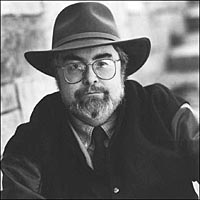| American Stories | |
| by Charles P. Pierce |
 Used to be that my grandmother told me stories. They weren't her stories, exactly. They were stories that she had heard from her parents, and grandparents, and her uncles and aunts on the family farm in Lixnaw, in north Kerry. They had all heard them from the shanachie, the itinerant storytellers who functioned not merely as entertainment, but also as the communal memory. A shanachie had to be good at the job, as it was the stories that got him fed and housed for the night. At any rate, it seemed like a good job to me.
Used to be that my grandmother told me stories. They weren't her stories, exactly. They were stories that she had heard from her parents, and grandparents, and her uncles and aunts on the family farm in Lixnaw, in north Kerry. They had all heard them from the shanachie, the itinerant storytellers who functioned not merely as entertainment, but also as the communal memory. A shanachie had to be good at the job, as it was the stories that got him fed and housed for the night. At any rate, it seemed like a good job to me.
 That's where it started for me -- the notion that telling the tribe its stories so that the tribe might be better for it was a valuable and honorable profession. (A good while later, I was talking to Pete Hamill, and I was pleasantly surprised to learn that he took very much the same approach to the craft.) In fact, if you read back through our own history as an independent people, you discover that the role of the shanachie is not far from the heart of what Mr. Madison and the rest of the assembled had in mind -- that a people free to be told its stories by those free to tell them is a people that will remain free. It's also why the colonial British used to arrest the shanachie wherever they found one. It's why the sheriffs used to bust the old bluesmen for "vagrancy." Of course they were vagrants -- that was their job. Their stories were vagrants, too, but nobody caught them. The stories are still free.
That's where it started for me -- the notion that telling the tribe its stories so that the tribe might be better for it was a valuable and honorable profession. (A good while later, I was talking to Pete Hamill, and I was pleasantly surprised to learn that he took very much the same approach to the craft.) In fact, if you read back through our own history as an independent people, you discover that the role of the shanachie is not far from the heart of what Mr. Madison and the rest of the assembled had in mind -- that a people free to be told its stories by those free to tell them is a people that will remain free. It's also why the colonial British used to arrest the shanachie wherever they found one. It's why the sheriffs used to bust the old bluesmen for "vagrancy." Of course they were vagrants -- that was their job. Their stories were vagrants, too, but nobody caught them. The stories are still free.
I think we're losing a lot of that. In journalism, at least. Storytelling is losing out to the sharp practitioners of glib irony and to a heretical beginning-middle-end formulation that presumes that the beginning, the middle, and the end are always right where they're supposed to be; that the beginning is not all tangled up in the end; and that the middle is as easily defined as a cowpen, and possessed of roughly the same initiative and imagination present there. This, to me, is nonsense. The great Flann O'Brien argues -- convincingly and, more important, hilariously -- that a story should have several beginnings and an infinite number of endings. And he is, of course, correct. Any shanachie who followed the strict rules by which most editors -- and many writers, alas -- ply their trades would've starved by the side of the road within the month.
That's where it started for me, anyway. That's why most of the stories in Sports Guy ramble. That's why, in the story of Berwick, Pennsylvania, and its football team, you meet the unluckiest Union soldier of the Civil War. That's why, in a story about Peyton and Archie Manning, you meet a man named Peerless, whose friends call him Peer, and why not, I say. That's why, in most of the stories, you run into what the unimaginative might call trivia, and what bullish editors might refer to as digressions. But that's what stories do. They digress. They wander. They open the cabinets and peek under the beds. They get into places they're not supposed to get into. And, then, the best of them come around again, right where they're supposed to be, but deeper and richer, with more to them. The Southern guys -- from Faulkner to Blount to Twain to Pearson to Robert Johnson to McKinley Morganfield [aka Muddy Waters] -- seem to know this best. I always write better in the South, and I don't know why, exactly. Of course, a lot of Irish settled there, too.
Charles P. Pierce recommends:
 Flann O'Brien, At Swim-Two-Birds
Flann O'Brien, At Swim-Two-Birds
I read this chair-through-the-windows madhouse of a book once a year. Not merely to make my fellow passengers nervous by giggling uncontrollably on airliners, but as a measure of how supple and wonderful storytelling can be. Nobody who writes can help but be chilled by the scene in which an author's characters put him on trial for misuse of his authority over them. If you want to work up to this one -- it's an adult portion, believe me -- try "The Dalkey Archive," with its hysterical underwater colloquy with St. Augustine, or "The Third Policeman," a deft depiction of hell that makes Dante look impossibly literal.
 T.R. Pearson, The Neely Trilogy (The Last of How It Was, A Short History of a Small Place, and Off for the Sweet Hereafter.)
T.R. Pearson, The Neely Trilogy (The Last of How It Was, A Short History of a Small Place, and Off for the Sweet Hereafter.)
Pearson has moved on into other, interesting territory. (In his last novel, Blue Ridge, he even abandoned his glorious ability with horizon-length sentences.) Nevertheless, his first three novels construct a wonderful, perfectly enclosed world full of wandering souls embattled by Providence's limitless gifts with the whoopie cushion and the dribble glass. And little Louis Benfield, the narrator of A Short History of a Small Place, is the wisest and most winning child east of Huck Finn. Also, a cautionary tale of the threat to society by door-to-door caster salesmen.
 Charles Portis, Masters of Atlantis
Charles Portis, Masters of Atlantis
This is why America is the best country ever devised in which to be completely unhinged.
Albert Murray, Stomping The Blues
The best book written about the best America that the Civil War produced.
 Greil Marcus, Mystery Train and Invisible Republic
Greil Marcus, Mystery Train and Invisible Republic
The soundtrack to the best America that the Civil War produced. Marcus is the person who first wrote the phrase, "the old, weird America," which is the America that I always look to find.



 Charles P. Pierce is writer-at-large for Esquire, a weekly commentator on NPR's "Only a Game," and a frequent guest on NPR's "Wait, Wait, Don't Tell Me." Together with Roger Angell he has been featured in the Best American Sportswriting annuals more often than any other writer. He lives in Massachusetts.
Charles P. Pierce is writer-at-large for Esquire, a weekly commentator on NPR's "Only a Game," and a frequent guest on NPR's "Wait, Wait, Don't Tell Me." Together with Roger Angell he has been featured in the Best American Sportswriting annuals more often than any other writer. He lives in Massachusetts.
Sports Guy: In Search of Corkball, Warroad Hockey, Hooters Golf, Tiger Woods, and the Big, Big Game
A March/April 2001 Book Sense 76 pick:
"Pierce possesses a humanity that shines through when he writes about the people that play the sports. Whether he's taking the luster off the myth of Tiger Woods or lionizing the guy who holds pole vaulting clinics in his barn, his writing rings true and heartfelt. You should not miss the Sports Guy." -- Stan Hynds, Northshire Bookstore, Manchester Center, VT
Author photo by Sara Barrett.
